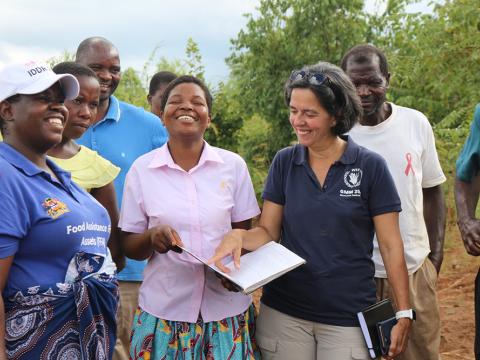World Food Programme hails World Vision’s work in Malawi

By Faison Masina, Communications Assistant
While nearly 180,000 farming families in Malawi are afraid of the future following the cyclone Idai induced flooding that damaged farms and livelihoods, farmers in Traditional Authority Chikowi in Zomba district are smiling to the future.
The perceived new era of life comes following a successful implementation of a Food For Asset (FFA) project in the area by World Vision, with financial support from the World Food Program (WFP).
World Food Programme’s Regional Director, Lola Castro, who visited the community from Johannesburg, South Africa, appreciated World Vision’s work and the impact the project is making in Chisuzi area.
Castro said she was impressed with the results of the project.
“I am very happy to see that the project is achieving positive results to the people and I am very happy to see that men and women are working together.” Said Castro.
Addressing the community, Country Director for World Food Programme in Malawi, Benoit Thiry who accompanied Castro, said that he wishes the project was extended to reach other beneficiaries.
“I am encouraged to see that the project has progressed and as World Food Programme we are ready to promote it. I am asking you, people, to continue working hard and graduate from the project so that others can also benefit.” Said Benoit.
The FFA project has benefitted 29,056 households with a population of about 159,808 since 2015. The project is expected to end in May 2019.
In his remarks, Wallace Givah, World Vision’s project officer for the FFA project in Zomba, said they thought of introducing the project in the area to deal with the impact of climate change.
“After observing that people in this area were constantly affected by rainwater from Ulumbe hills and resulting into hunger, we thought of assisting these people through a project that addressed not only flooding challenges, but food security, nutrition and sanitation”, said Wallace.
Miriam Mwatchiwa, one of the beneficiaries from Kankhomba village in the district said the project has transformed the community as they are no longer affected by running water from Tulumba hill, which is next to the village.
“In the past we used to be affected by running rainwater from Tulumba hills, washing away our farmlands and houses every rainy season”, said Miriam before adding that the World Vision implemented project has encouraged them to plant trees around the hill, dig deep trenches, check dams and create swales to hold running water from the mountain.
This year, only 4 houses collapsed in the whole village of 230 households, a feat Miriam credits to the environmental management interventions they have carried out.
Year in and year out, when floods swept through this village, they left a trail of hunger and suffering, according to Miriam.
“Our gardens and houses have been saved. These activities have really helped to control the flow of water from the hill”, said Miriam, smiling as she moved around to monitor the project area.
While they planted trees and took care of the old ones to retain the village’s natural cover and prevent themselves from flooding, Miriam says the community is reaping even more.
“So apart from controlling the flow of water downhill, we have also started beekeeping in the forest and making some money.” Said Miriam.